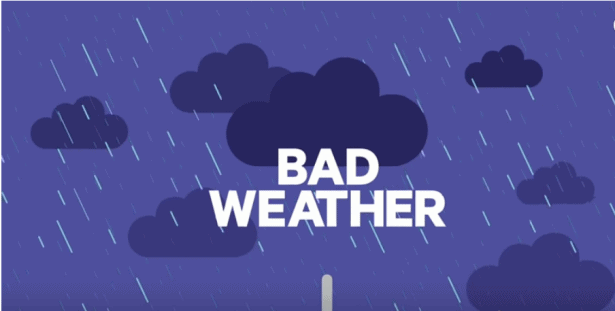Cellular network traffic is carried on radio waves, and so cell reception can be affected by any atmospheric condition that might similarly affect a terrestrial radio signal.
In fact, weather can have a direct or an indirect effect on 4G cell signal, but won’t really affect cell signals under 2GHz. An example of a direct effect would be a thunderstorm when lightning causes electrical interference with cell signals.

An indirect effect of weather on cell reception could be caused by a change of season, say from winter to spring.
For example, in a single-story home or office building surrounded by trees, this could mean better indoor cell reception in winter when bare trees are less of an obstacle to incoming and outgoing signals.
With the coming of spring, the surrounding trees bud out and then produce leaves. This increased foliage can diffuse, weaken and even block cell signals traveling to and from the cell tower. Of course, this can negatively affect cell service for those inside the building, although not directly attributable to the weather conditions of the present day.
How weather affects cell phone signal
Basically, any water in the atmosphere that comes between your phone and the cell tower is not a good thing. Water impedes radio waves on the frequencies used by cellular networks. That means rain, snow, fog, clouds – even a bright, sunny day with high humidity – can cause cell reception to drop off.
This signal impedance happens because water conducts electricity, which allows water vapor in the atmosphere to reflect or refract radio waves. Engineers call this the “propagation delay effect.”
But for you and me it means the cell signal is (a) diluted by noise and (b) takes longer to get where it’s supposed to go (either to your phone or the tower) which we notice as reduced reception.
But the negative impact on your cell reception can vary with specific weather conditions. See below.
- Rain – Does rain affect internet speed? Rainstorms are likely to have the greatest effect on cell reception because of the density of water vapor associated with them. The heavier the rain, the more likely it is to negatively affect your reception.
- Atmospheric water vapor (like rain) can also reduce your cell reception by absorbing energy from radio waves. The absorbed energy is converted into heat – the same thing your microwave oven does when you cook a bag of popcorn or warm up leftovers.
- Lightning – Thunderstorms, aside from any rain, are a problem because lightning causes electrical interference. Of course, a lightning strike can damage cell towers or other network equipment, affecting local cell service.
- Snow and hail – These would likely have a lesser effect on your cell reception than rain because ice, in the form of snowflakes or hailstones, is less dense than water in liquid form. However, particularly heavy snow can really refract radio waves.
- Fog & clouds – Again, these would probably affect cell reception less than rain, but they can still scatter radio waves in localized areas.
- Temperature – Heat or cold, exclusive of other weather conditions, should have no effect on your cell reception. Now, it may seem like outside temperatures affect your signal, but this is almost always the result of humidity changes that accompany warming or cooling temps.
- Wind –Wind by itself, like temperature, should not affect your cell reception. But any of the above-described weather conditions associated with high winds certainly can cause reception issues. High winds can also damage cell network equipment and power lines, which could affect local cellular service.
Comments
Post a Comment